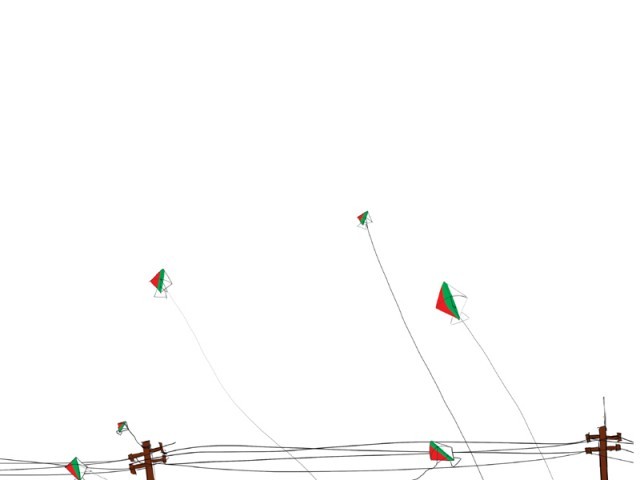Reality check: People who made policies to finish the MQM know nothing of Karachi’s politics: Mohammed Hanif
KARACHI: In Harry Potter and the Deathly Hallows Part II, Harry and his friends enter a vault full of gold and silver. In order to fend off thieves, a spell has been cast to protect the treasures – as soon as the children touch anything it starts to multiply so fast that they cannot escape from under the mounds of popping, reproducing metal. The motif is an old one that dates to the Greek Hydra or water serpent – if you chop off one of its heads, two more appear in its place. In fact, it exists very much in Pakistan where a Pakistan Peoples Party (PPP) slogan is rife with the symbolism: Tum kitne Bhutto marogey, har ghar se Bhutto niklega. How many Bhuttos will you slay? One will emerge from every home.

Instead of focusing on political tiffs, we should ask how these strikes and vacillations affect the people, says author and journalist. DESIGN: ANAM HALEEM
But now perhaps we can start thinking of another party along these lines: the Muttahida Qaumi Movement (MQM). Consider what Mohammed Hanif, a BBC journalist and author, had to say on the television programme Kal Tak with host Javed Chaudhry on Express News on Monday. Chaudhry asked Hanif to comment on what the MQM’s position would be if it rejoins the government given that it has come and gone five times in six months. What is the guarantee that this will be a final return? How does this affect its standing, if at all negatively?
“The thing is that the MQM’s standing in Karachi is quite intact and is quite old,” replied Hanif. He went on to refer to events that transpired earlier on in the day when members from an old faction of the MQM, the Mohajir Qaumi Movement-Haqiqi (MQM-H), announced that it was returning to the party fold. “So, we should keep in mind that this is not a story of just yesterday,” said Hanif, bringing up the army operation in the 1990s against the MQM.
“…[B]y creating a faction, after bringing on 200 to 250 boys, there was an attempt to make an organisation. And the attempt at that time, of our state apparatus was to finish off the MQM somehow.” Similar attempts were made much earlier as well. “But the people who make these policies, neither do they know anything about Karachi’s conditions nor do they know anything of the feelings of Karachi’s people and neither do they, truth be told, know anything about the politics of this place.”
Hanif said that as far as he has seen, in the last four or five elections, major analysts from other parts of the country come to Karachi and predict that the MQM’s standing has been eroded. “So, there is a lot of wishful thinking included in this,” Hanif added. “The MQM has gone through good times and bad but as far as the MQM’s vote bank is concerned, this talk doesn’t make much of a difference.”
At this point, Chaudhry pressed Hanif by asking whether the party’s moral standing was compromised by its constant joining and leaving the government? Hanif deconstructed this as a two-pronged question on moral standing versus political standing. “Of all our political rulers, I’m pretty sure that none of them can claim piety [on these fronts] whether it is the PPP or the Nawaz League or even the MQM, which also lays many claims to being pious,” Hanif said. “A lot of people do not buy it.”
As far as political standing is concerned, the problem is that in Karachi, ever since the MQM has started representing the Urdu-speaking people, no alternative has been allowed to form by either keeping the MQM out of the government or by undertaking an operation against it. “As a result of this, for better or worse, the MQM’s vote bank becomes stronger than before,” Hanif remarked.
“So, as far as elections are concerned, as far as the MQM’s standing is concerned, I don’t see any difference being made to it,” he said. At this point he paused, and chuckled. “But, you analysts tend to forget. Why do you always talk about MQM’s political standing? Why do you constantly keep referring to government making and breaking?” Why do they not talk instead of the effect on Karachi that the joining and leaving the government has?
Why do analysts not talk about what the people who live in Karachi undergo? For Hanif, all of us tend to forget that Karachi is such a big city of millions of people; if they don’t leave their houses each day to earn a living their kitchen fires cannot be lit. “It is, as you say in the Punjab, the dehari-dar,” remarked Hanif. “They will only drink if they get out and go and dig the well.” But in Karachi, after every week to ten days, there is a strike. The bodies are felled. “That is what we need to talk about more instead of the coming elections and who will win or lose,” said Hanif.
Chaudhry continued to try to elicit some kind of prediction from Hanif on whether the MQM would stay in the government before the elections. To this, Hanif replied: “If they have come and gone so many times in six months, then I think it would be difficult to predict what will happen in the next year. But, it does not seem to me that when the next elections come around that the MQM would want to be sitting in the government. Who will want to take the responsibility [for] the conditions in the city and the province? Who will want that to be laid at their doorstep? I do not think that the MQM will want to continue to be with the PPP till the elections.”
Published in The Express Tribune, August 17th, 2011.